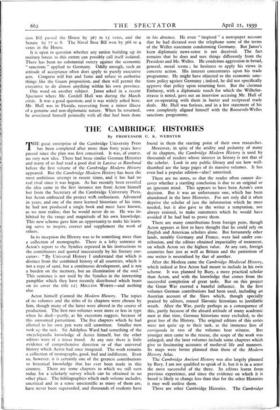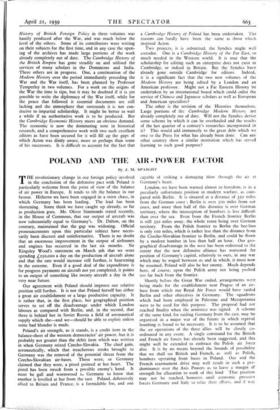THE CAMBRIDGE HISTORIES
By PROFESSOR C. K. WEBSTER
THE great enterprise of the Cambridge University Press has been completed after more than forty years have passed since the plan was first conceived. It was, of course, no very new idea. There had been similar German Histories and many of us had read a good deal in Lavisse et Rambaud before the first volume of the Cambridge Modern History appeared. But the Cambridge Modern History has been the most ambitious attempt in recent times, and it has had no real rival since it was begun. As has recently been revealed the idea came in the first instance not from Acton himself but from the Secretary of the Cambridge University Press, but Acton embraced the project with enthusiasm. Advanced in years, and one of the most learned historians of his time, he had not produced a single book and must have known, as we now realise, that he would never do so. He was in- hibited by the range and magnitude of his own knowledge. This new scheme gave him an opportunity to make his learn- ing serve to inspire, correct and supplement the work of others.
In its inception the History was to be something more than a collection of monographs. There is a lofty sentence in Acton's report to the Syndics repeated in his instructions to the contributors and quoted inaccurately by his literary exe- cutors: "By Universal History I understand that which is distinct from the combined history of all countries, which is not a rope of sand, but a continuous development, and is not a burden on the memory, but an illumination of the soul." This sentence is not used by the Syndics in the interesting pamphlet which they have recently distributed which bears on its cover the title 124- MILLION WoRns—and nothing else.
Acton himself panned the Modern History. The topics of its volumes and the titles of its chapters were chosen by him, though many of the latter were altered in the course of production. The first two volumes were more or less in type when he died—partly, as his executors suggest, because of this unwonted parturition. The five chapters which he had allotted to his own pen were still unwritten. Smaller men took up the task. Sir Adolphus Ward had something of the encyclopaedic knowledge of Acton himself, but the other editors were of a lesser breed. At any rate there is little evidence of comprehensive direction or of that universal history which Acton had once imagined. The work remains a collection of monographs, good, bad and indifferent. Even so, however, it is certainly one of the greatest contributions to historical knowledge that has ever been made in this country. There are some chapters to which we still turn today for a scholarly survey which can be obtained in no other place. The bibliographies which each volume includes, uncritical and in a sense unscientific as many of them are, have never been superseded, and thousands of students have found in them the starting point of their own researches.
Moreover, in spite of the aridity and pedantry of many of its chapters, the Cambridge Modern History is used by thousands of readers whose interest in history is not that of the scholar. Look in any public library and see how well- thumbed are the large pages of its massive volumes. It has even had a popular edition—alas! unrevised.
There are no notes, so that the reader often cannot dis- cover whether a startling conclusion is due to an original or an ignorant mind. This appears to have been Acton's own decision. But it was an unfortunate one, which has been abandoned in the later Histories. For not only did it often deprive the scholar of just the information which he most needed, but it also gave to the writer a temptation, not always resisted, to make statements which he would have avoided if he had had to prove them.
There are many contributions from foreign pens, though Acton appears at first to have thought that he could rely on English and American scholars alone. But fortunately other lands, notably Germany and France, were laid under con- tribution, and the editors obtained impartiality of treatment, on which Acton set the highest value. At any rate, foreign countries fare just as well as Britain and the patriotism of one writer is neutralised by that of another.
After the Modern came the Cambridge Medieval History, which indeed at first Acton had meant to include in his own scheme. It was planned by Bury, a more practical scholar than Acton, and with the knowledge that comes from the successful completion of great tasks. But on this project the Great War exerted a baneful influence. In the first volumes German contributions had been used, including an Austrian account of the Slays which, though specially praised by editors, roused Slavonic historians to justifiable wrath. After the War, partly perhaps as a consequence of this, partly because of the absurd attitude of many academic men at that time, German historians were excluded, to the great loss of the History. The original editors of this series were not quite up to their task, as the immense lists of corrigenda in two of the volumes bear witness. But younger men came to the rescue, the scope of the work was enlarged, and the later volumes include some chapters which give -us fascinating accounts of medieval life and manners. Its maps were better planned than those of the Modern History Atlas.
The Cambridge Ancient History was also largely planned by Bury. I am not qualified to speak of it, but it is in a sense the most successful of the three. Its editors learnt from previous experience, and since the evidence on which it is based is likely to change less than that for the other Histories it may well outlive them.
There are other Cambridge Histories. The Cambridge History of British Foreign Policy in three volumes was hastily produced after the War, and was much below the level of the others. Some of its contributors were writing on their subjects for the first time, and in any case the open- ing of the archives has made large portions of the work already completely out of date. The Cambridge History of the British Empire has gone steadily on and utilised the services of many scholars in the Dominions and India. Three others are in progress. One, a continuation of the Modern History over the period immediately preceding the War and the War itself, has been planned by Professor Temperley in two volumes. For a work on the origins of the War the time is ripe, but it may be doubted if it is yet possible to write the diplomacy of the War itself, while for the peace that followed it essential documents are still lacking and the atmosphere that surrounds it is not con- ducive to impartial scholarship. It might be better to wait a while if an 'authoritative work is to be produced. But the Cambridge Economic History meets an obvious demand. The economic is now the dominating note in historical research, and a comprehensive work with two such excellent editors as have been secured for it will fill up the gaps of which Acton was dimly aware, more so perhaps than some of his successors. It is difficult to account for the fact that a Cambridge History of Poland has been undertaken. The reasons can hardly have been the same as those which inspired Acton.
Two projects, it is submitted, the Syndics might well consider. One is a Cambridge History of the Far East, so much needed in the Western world. It is true that the scholarship for editing such an enterprise does not exist in Cambridge, or indeed in Britain. But the Syndics have already gone outside Cambridge for editors. Indeed, it is a significant fact that the two new volumes of the Modern History are being edited by a London and an American professor. Might not a Far Eastern History be undertaken by an international board which could enlist the service of Chinese and Japanese scholars as well as European and American specialists?
The other is the revision of the Histories themselves. Large portions of the Cambridge Modern History are already completely out of date. Will not the Syndics devise some scheme by which it can be overhauled and the results of the last quarter of a century's researches incorporated in it? This would add immensely to the great debt which we owe to the Press for what has already been done. Can any other country show a similar institution which has served learning to such good purpose?











































 Previous page
Previous page